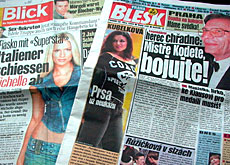Swiss tabloid formula Czech-mates rivals

Clones of Switzerland’s best-selling newspaper, “Blick”, have proved a hit with readers across central and eastern Europe.
In the Czech Republic, where the media has been completely transformed since 1989, the leading newspaper is a replica of the Swiss tabloid.
It is no coincidence that “Blesk” (Lightning) bears more than a passing resemblance to the “Blick”: its publisher is the Swiss Ringier group.
Until the end of the 1980s, the most widely read newspaper in Prague was “Rude Pravo” (Red Law), the official mouthpiece of the Communist Party and the only paper you could be sure to find in even the remotest corner of Czechoslovakia.
In those days, many people dreamed of press freedom and an end to censorship.
But not even the most ambitious dreamer could have foreseen how radically the media landscape was to change in just a few years, along with the rest of Czech society.
And certainly no one could have imagined that barely ten years later, the most popular newspaper would be “Blesk”, with the same winning formula as other Western European tabloids: a dash of sex, a twist of violence and a generous dose of sport.
Export
The Zurich-based Ringier group was quick to look East after the fall of Communism. The Swiss publisher is now one of the largest print media producers in Central and Eastern Europe, where it churns out more than 30 daily newspapers and magazines.
The “Blick” formula, often criticized on home territory, has become Switzerland’s most successful export in the information sector.
In Hungary, it goes by the name of “Blikk”, in Serbia “Blic”, in Romania “Libertae” and in Slovakia “Novy Cas”(“New Times”). The name may differ from country to country but everywhere the tabloid has the highest circulation figures.
Local knowledge
“It’s taken many years to get the public used to this style of news presentation, to overcome a kind of diffidence or reserve regarding certain topics,” Tomás Böhm, Ringier’s director in the Czech Republic, told swissinfo.
“Blesk” has become a firm favourite with the general public and it is widely read in bars, trams, offices and the home.
Various attempts to usurp its leading position have failed. Two new rivals had to close down in 2001 after very short print runs.
“The mistake our competitors made was to try and import replicas of foreign newspapers without taking into account local needs,” says Böhm.
“Our newspaper manages to get to grips with the realities of daily life here and all the articles are locally generated.”
Political neutrality
Böhm explains that “Blesk” has also been careful to stay politically neutral.
“Every other national newspaper has its own political bias, but ‘Blesk’ has followed the Swiss model by [not siding] with any political parties or those in power,” he adds.
“And this policy has paid off because democratisation has also brought disappointments and a growing detachment where political life is concerned.”
With a circulation of half a million copies, “Blesk” in fact exercises considerable influence over public opinion. But the Ringier policy is that information of a political nature should be geared primarily to satisfying public curiosity.
“A few months ago we published a rather embarrassing photograph of the current Czech president, Vaclav Klaus, caught kissing a young woman,” explains Böhm by way of example.
“But we [weren’t making a] political comment, we published it because it was interesting for our readers.”
The need to dream
In a bid to hold on to their market share, other national newspapers have also started printing sensational front-page stories.
“Censorship is long gone, but sometimes you wonder if the standard of journalism has really improved,” complains Alan Levy, director of the weekly publication ‘The Prague Post’.
But Böhm believes that ultimately it is all about publishing the stories that people want to read.
“We have stories for everyone can read and which are quick to digest: bizarre stories about ordinary people, stories about famous people, the achievements of sports personalities, photographs of attractive women.”
The advent of press freedom may not have fulfilled everyone’s hopes, but at least “Blesk” is giving the people of Prague something to dream about, Böhm adds.
swissinfo, Armando Mombelli in Prague
Ten million people live in the Czech Republic.
The average per capita income is €800 (SFr1,240) a month.
The unemployment rate is 8%.
The rate of economic growth between 1999 and 2002 was 2.9%.
In 2001, Swiss investment in the Czech Republic amounted to SFr1.9 billion.
The Zurich-based Ringier group set up operations in Prague in 1990.
It now publishes over ten titles covering current affairs, social life, sport and television.
The daily newspaper “Blesk” (circulation 450,000), the weekly publication “Blesk Magazin” (530,000) and the Sunday “Nedelni Blesk” (300,000) head the sales rankings in the Czech Republic.
Ringier employs 2,500 people in five Central and Eastern European countries, with 30 publications and a global turnover of over SFr1 billion.

In compliance with the JTI standards
More: SWI swissinfo.ch certified by the Journalism Trust Initiative

You can find an overview of ongoing debates with our journalists here . Please join us!
If you want to start a conversation about a topic raised in this article or want to report factual errors, email us at english@swissinfo.ch.